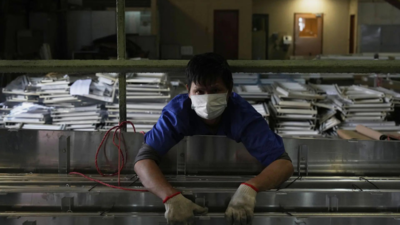‘Made in South Korea’: How Chinese companies are allegedly ‘evading’ Trump tariffs

Chinese companies are allegedly evading steep US tariffs by fraudulently exporting goods as South Korean products, Japanese news outlet Nikkei Asia news reported.
According to Korea Customs Service, exports falsely labeled as made in South Korea amounted to 29.5 billion won for the January-March quarter. In this, the goods exported to the US accounted for 97 per cent.
“The total for all of last year was 34.8 billion won”, it said. Fraud uncovered so far in 2025 has already reached 85% of the full-year total for 2024.
According to the report, in some instances, prices of goods have also been deliberately under declared to lower tariff costs.
South Korea’s customs service highlighted a number of such schemes, including the case of Chinese-made mattresses—which are subject to anti-dumping duties in the US—being routed through South Korea.
These mattresses were stored in warehouses operated by a company registered under a Chinese national’s name in South Korea, and then exported to the US falsely labeled as South Korean products.
In another example, anode materials used in rechargeable batteries were shipped from China, repackaged in South Korea, and falsely labeled before being exported.
Similarly, parts for surveillance cameras were imported into South Korea, assembled domestically, and then exported under the guise of being South Korean-made.
South Korea’s customs agency has now established a special task force to investigate and crack down on these deceptive trade practices. Authorities warned that such tactics could undermine South Korea’s trade credibility and harm domestic industries that abide by international regulations.
The crackdown comes as South Korea enters a new round of trade talks with the United States this week. Analysts suggest the timing may be strategic, aimed at demonstrating Seoul’s commitment to curbing indirect exports of Chinese goods, a key concern for the Trump administration.
Earlier, the Wall Street Journal reported that US officials are expected to press their South Korean counterparts during negotiations to prevent such circumvention of tariffs. In response, China’s ministry of commerce said that it would reject any trade deal that compromises Chinese interests and vowed to take reciprocal countermeasures if needed.
US President Donald Trump’s administration has slapped goods from China with tariffs that have soared to 145%. Although South Korean goods have also been hit with “reciprocal” tariffs currently on a 90-day pause, their tariff rate of 10% for now is far more favorable.




